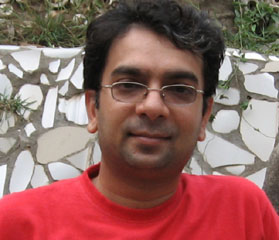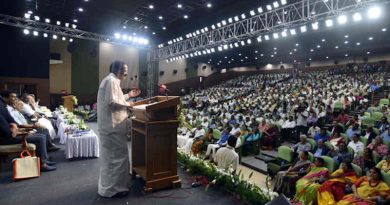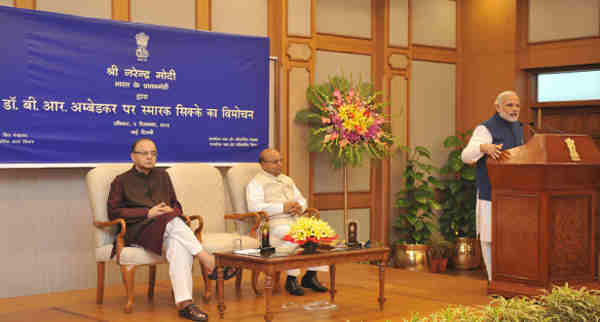India and the Morality of Corruption
For the past few weeks, corruption has become a fashionable topic in India. Starting from Anna Hazare’s fast over Lokpal Bill to Baba Ramdev’s anti-black money drama, anyone who’s got an opinion is voicing it stridently. There’s a flood of opinions in electronic media, in the papers and on the chatter of Facebook and Twitter.
By Sanjay Gupta
But all this brouhaha is the product of an increasingly and shamelessly corrupt nation. And it would hardly result in a major change in the way politicians and bureaucrats have been looting the country.
Before giving my reasons for saying so or suggesting any semi-cooked corruption-curing recipes of my own, let me state where my loyalties lie.
I’m neither with BJP-RSS-Sangh types nor with the Congress or its multiple splinter groups, nor with any just-for-name’s-sake-group on any social networking site.
I am, in fact, with the proverbial and much-abused common man who, while all this media circus is going on, is busy carting a back-breaking load of supplies through our ramshackle markets.
I’m with the man who is trying to survive with meager earnings from his nondescript kiosk-shop. I’m with the girl who must hurry home if she doesn’t want to be raped or teased and who hasn’t got a chauffeur-driven car to take her home.
I’m with the homeless beggar who is being harassed by the policeman and the gangster alike. I’m with the farmer whose irrigation water is diverted to serve five-star hotels and resorts. And I’m with about 700 million poor people of India who never understood the meaning of Shining India and probably never will.
[ Also Read: 10 Simple Reasons I Love My Country India ]Let me take you a little back in time. I’m not sure how many of you would appreciate it, but I grew up on an ample dose of all-round prosperity shown on Krishi Darshan (a government TV program).
It was taught in school books and preached through a state-controlled media. I was under the impression that the founding fathers of this nation had done a great job by putting together a wonderful Constitution. And by following in the footsteps of our erstwhile rulers (the British), they kept a gargantuan bureaucracy as well-oiled as you would find in a spanking factory.
How was I to know that all that oil was actually grease, exchanging millions of palms for the enrichment of their owners alone? How was I to know that while our leaders threw out the tyrant rule of the British, they wittingly or unwittingly installed a draconian regime that thrived on abusing power?
[ Also Read: Can Anna Hazare Give Us Corruption-Free India? ]I wouldn’t bore you with all the details of a newly Independent, proud India with great leaders having a great vision for our great nation. But the bottomline is this: our population control measures have failed. Our aging infrastructure (much of it bequeathed to us by the British) is deteriorating.
The sub-standard products made by our ‘license raj’ industrialists have mostly failed to stand against global competition (do a count of how many products we buy come from China and elsewhere). Our socialistic mutlipoint programs and hare-brained schemes have failed to give social security to the poor…The list of failures just goes on and on.
But yes, we have succeeded in creating a vicious, greedy, bloated and extremely corrupt ‘governance’ system. And at the tentacled head of this system sits that obsequiously dynastic, shamelessly appeasing and pathetically spineless ‘grand old party’ – with a foreigner madame and a stooge of a man currently at the helm.
[ Also Read: How MMS becomes the Prime Minister ]This otherwise useless party seemed to have done a good thing when it opened up the Indian economy in the early nineties. But, alas, it all came a cropper!
While the license raj was being disbanded, a new band of robbers and looters emerged – and they were of all forms and persuasions, comprising politicians, bureaucrats, land grabbers, deal brokers, thugs and curmudgeons.
This band set out in earnest to divvy up the natural and other resources of the country. They did it largely among themselves, but threw away some bits and pieces off and on for the rising middle, lower middle, lowest middle and god-knows-how-even-lower middle classes.
Some crazy statistics were rustled up about the benefits of all this ‘wealth creation’ trickling down to the lowest rungs of society. Never mind that the trickle has been nothing but a stinky obnoxious drain.
[ Also Read: Peepli Dead: True Story of Cyber Zombies in India ]If you are stats oriented, chew these: more than 75% of Indian population has a purchasing power of less than Rs. 20 (1 USD ~ Rs. 45 approximately) a day. Nearly half of Indian children are malnourished. About 110 million agricultural workers found employment for only 209 days in 2004-05 compared to 220 days in 1999-2000. Around 150 of India’s 607 districts are engulfed in Naxalite movement. And while the much-touted GDP growth races ahead in the 7-9% range, employment growth has been a meager 1%…
In these twenty or so years of liberalization, one of the most ‘liberalized’ things in India has become honesty and integrity. While the slogan of India’s freedom fighter Subhash Chandra Bose was “Tum mujhe khoon do, main tumhein azadi doonga” (You give me blood, and I’ll give you freedom), the prevalent leitmotif in an increasingly corrupt India has become “Tum mujhe ghoos do, kyonki main kisi aur ko doonga!” (You better give me bribe, coz I gotta give it to somebody else.)
[ Also Read: 5-Point Formula for Anna Hazare to Kill Corruption ]Mera Bharat mahaan, indeed! (My India is great)
It is this ghooskhor or bribe-infested culture that seems to have captured the absconding imagination of a few lakh people (a handful in the colossus of India) all of a sudden.
Ask any businessman – from the local chaiwalla (tea seller) to the global Ambani – about the number of times they have to bribe the multiple power brokers in order to survive (in Ambani’s case, thrive).
Ask the owners of the buildings in any Indian city (most of which are truly ugly and urgently in need of fresh air) whether they could have erected those eyesores without making “the authorities” turn a blind eye to their multi-storied plans?
Hell, ask yourself, would you be able to survive the daily horrors of getting a gas connection, registering a property, obtaining a government stamp of approval, securing school admission for your child and innumerable such “tasks” without paying any bribes to someone?
So, in a broader view of things, almost all of us are corrupt.
But the way in which the high and mighty are corrupt – and the way they engender this culture of corruption all around them – calls for special discussion.
Imagine a unit of society in which the head of that unit is corrupt. The unit could be a family, a resident welfare association, a local governing body, a state government or the central ruling formation.
This head goes about lining their pockets at the expense of others, asks and permits others to do as they please so long as all those “involved” get their “cuts”, and generally remains unaffected by the misery of those way down below in the hierarchy. How do you think one can cure this unit of the curse of corruption?
By asking those at the bottom of the ladder to not pay bribes? By just complaining about the situation and the whole machinery? By pressing the Like button on someone’s anti-corruption page?
[ Also Read: Using Social Media for Social Change: Mallika Dutt ]No, dear reader, of course, not. And that’s precisely what we the people of India seem to be doing. From the above example, I’m sure you would agree that the most effective way of making the unit corruption-free is to remove the head of the unit and replace him or her with an honest, caring one.
And that’s where the biggest challenge for India lies. My question is, who do you install in place of the current corruption-laden ruling parties in India? Which national-level party today is without the stains of corruption?
A bigger and related question: Do we have any leader of the stature who can clear up the mess in our heritage-rich but idea-poor country? Can anyone take India to the social, economic and scientific heights achieved by the likes of US and Japan (or by its own people centuries ago)?
Is there anyone who can ensure that calling India a superpower in the making is not a laughing matter but a matter of progressive achievement? (For one, I laugh out loud at such peasant-like thinking, given the way things are going.)
Who is going to be that person? That leader?
Anna Hazare? Hmmm, perhaps, but let me think…
Sonia Gandhi? I was so happy that she refused to be Prime Minister (PM) – only to be much angry later when she installed that puppet-puppy PM…and we all know how many corruption scandals have erupted. Why, you are reading this article because of that!
LK Advani? Gadkari? Narendra Modi? No way!
Baba Ramdev? He doesn’t see himself in politics – and neither do I!
Rahul Baba? He has neither the credentials nor the credibility (what he has is the Gandhi dynasty and a boatload of sycophants)…
You? Me? What are we talking about!
Alas, my dear reader, no one. To my eyes, there is NOT A SINGLE human being (as far as that weary eye can see) with the moral courage, impeccable integrity, caring humanity and a wide support base who can lift India out of the abyss of corruption and then take it to the greatness we are so fond of remembering.
And so? So we keep on trying (or pretend to), while the millions keep on dying. Sorry, CK Prahalad, despite your philanthropic economic advice, when it comes to India, there’s only misfortune at the bottom of the pyramid.
Sanjay Gupta is an independent writer. He has expressed his personal views in this article.







Kudos Sanjay!
I
Kudos Sanjay! I thoroughly enjoyed reading this piece of yours. Undoubtedly, the situation in our country is really bad, but there’s always hope and as they say, “When it’s completely dark, you can still see the stars!”
Well, everybody cannot come out on the roads like Ramdev and Anna, but atleast, we can and we must raise our voice against the current rotten system.
At this juncture, I recall a few lines of the renowned poet Sahir Ludhianvi:
वो सुबह कभी तो आएगी
इन काली सदियों के सर से जब रात का आंचल ढलकेगा
जब दुख के बादल पिघलेंगे जब सुख का सागर झलकेगा
जब अम्बर झूम के नाचेगा जब धरती नगमे गाएगी
वो सुबह कभी तो आएगी
With loads of best wishes !!
Diganta,
I believe your comments are meant as satire.
I think most citizens tend to forget – but not forgive. But the trouble is, what to do if not forgive – which national-level party can you confidently back as being non-corrupt? There seem to be skeletons in all cupboards, some fuller than others. That’s why I argued that we need a resolute, totally honest leader with a huge following.
Still, movements like Anna Hazare’s and efforts of a tiny group of people in the bureaucracy (like N Vittal’s, for instance) are needed and meaningful to keep the issues alive in national consciousness. As ordinary people, it’s up to us how and to what extent we can contribute. Your reading and commenting on this article is also a part of the whole process…
Hi Sanjay,
This is a thought-provoking piece for all the Indians. But, can we take the sword in our hands and fight the battle of corruption? Although people supported Anna’s movement at the beginning, Indians (including me) are very good in forgetfulness and forgiveness. In stead of making a huge noise against corruption, we should allow it to be a part of the system….probably this will be the most graceful way to live a shameless life….
Hi Mujahidha,
I agree with you in that a lot of countries that are either undeveloped or in the developing stage have the same story of corruption to share. Only the degree and extent of their corrupt leaders vary.
While many young people who have entered and stayed in politics up to ripe old age may have been corrupt, consider a couple of things. One, India itself is a ‘young’ country, having gained independence about 60 years ago. Two, with each new generation, there are changes of collective thinking and mindset brought forth by the prevailing social, political and economic situation. Improving education levels should also play a positive role.
Thanks for liking my write-up and let’s at least keep our hopes positive 🙂
I had to write a speech for college titled, ‘My country, my life’, with the condition that nothing negative be told about the motherland. 😛 So, its kind of funny, but that’s how I happened upon this article that is scathingly accusatory in content!
I’m actually a Sri Lankan studying in India, but what I can tell you from the foreigner perspective is that, we’ve got the same horror story back in my country. And I can’t disagree more on your opinion that ‘young and dynamic people will emerge at the fore front.’ You see, sir, the young people who enter into politics, ARE the ones who turn out to be the ‘future crop of geriatic, pot-bellied (CORRUPT) leaders.’
But then again, that could just be me being characteristically cynical! 😛
Thanks for the awesomely crafted read, though!
Dear Rishikanth,
It’s good to know that young kids like you read strongly worded articles on corruption. So, things are really bad, aren’t they? In my writeup I wanted to highlight the utter greediness and shamelessness of India’s politicians and bureaucrats. But that, of course, doesn’t mean I’m an absolute pessimist or that things have to be like this for ever.
For one, I believe youngsters can bring tremendous energy and the brightest of ideas to the grand table of Indian politics—provided they take time out from eating burgers or playing Farmville. I hope when our current crop of geriatric, pot-bellied ‘leaders’ has done its time in politics, some young and dynamic people will emerge at the forefront and make positive change happen.
Well, that was simply an amazing read. I’m like a young kid on the block and by what I read, I’d like to ask a question, which is true in its fact but I guess no one would like to answer, Is this the way things are going to be forever, are we doomed to complete misfortune?
Please do check out my view on this issue here,
http://www.youtube.com/watch?v=sla_ectqOxk&feature=channel_video_title
Like | Subscribe | Share
Cheers,
R